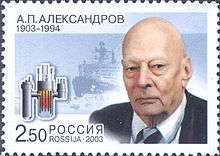Anatoly Alexandrov (physicist)
| Anatoly Alexandrov | |
|---|---|
 2003 Russian stamp commemorating Alexandrov. | |
| Born |
13 February 1903 Tarascha, Kiev Governorate, Russian Empire (now Ukraine) |
| Died |
3 February 1994 (aged 90) Moscow, Russian Federation |
| Nationality | Soviet, Russian |
| Fields | Physics |
| Alma mater | Kiev University (1930) |
| Doctoral advisor | Abram Ioffe |
| Doctoral students | Yuri Semenovich Lazurkin |
| Notable awards |
Hero of Socialist Labor (1954, 1960, 1973) Lenin Prize (1959) State Stalin Prize (1942, 1949, 1951, 1953) Kurchatov Medal (1968) Lomonosov Gold Medal (1978) |
Anatoly Petrovich Alexandrov (Russian: Анатолий Петрович Александров, 13 February 1903, Tarascha – 3 February 1994, Moscow), also known as A.P Alaexandrov, was a Russian physicist, director of the Kurchatov Institute, academician (from 1953) and president of the Academy of Sciences of the USSR (1975–1986). By the end of his life he had become the third most decorated man in the Soviet Union.
Anatoly Alexandrov was born on 13 February 1903 into the family of a prominent judge in the town of Tarascha, Kiev Governorate, Russian Empire (now located in modern-day Ukraine).
After his graduation in 1930, he was invited by Abram Ioffe to join him in Leningrad.[1]
Alexandrov became prominent during World War II, when he devised in collaboration with Igor Kurchatov a method of demagnetizing ships to protect them from German mines. The method was effective by the end of 1941 and was in active use through the end of the war and afterwards. Both Alexandrov and Kurchatov worked at the Ioffe Institute by that time (their laboratory separated from the Ioffe Institute and moved to Moscow in 1943 for the work on the Soviet atomic bomb project).[2][3][4] Alexandrov was a member of Communist Party from 1962.
Described by colleagues as a brilliant scientist and organizer, he was deeply affected by the Chernobyl disaster, the worst nuclear accident in history. It killed at least 32 people and caused widespread radioactive contamination. Tens of thousands of people were evacuated as a result. The accident subsequently prompted the Soviet Government to review and suspend the ambitious nuclear power program.
Alexandrov died of cardiac arrest on 3 February 1994 in Moscow.
Honours and awards
- Hero of Socialist Labour (1954, 1960, 1973)
- Order of Lenin, nine times (1945, 1949, 1953, 1954, 1956, 1960, 1973, 1978, 1983)
- Order of the October Revolution (1971)
- Order of the Red Banner of Labour (1945)
- Medal "For the Defence of Stalingrad" (1945)
- Medal "For the Defence of Sevastopol" (1945)
- Lenin Prize (1959)
- Stalin Prize (1942, 1949, 1951, 1953)
- Diploma of the Presidium of the Supreme Soviet of the Russian Federation (1993)
- Kurchatov Medal (1968)
- Lomonosov Gold Medal (1978)
- Vavilov Gold Medal (1978)
- XXXVIII Mendeleev Reader (4 February 1982)
- Order of Sukhbaatar (Mongolia, 1982)
References
- ↑ Johnson's Russia List.
- ↑ Александров А. П. Годы с Курчатовым // Наука и жизнь, 1983, № 2 (in Russian)
- ↑ Коптев Ю. И. Виза безопасности. — СПб.: Изд-во Политехнического Университета, 2008. — 66 стр. (in Russian)
- ↑ Регель В. Р. Размагничивание кораблей в годы Великой Отечественной войны // Природа. 1975, № 4 (in Russian)
External links
- "Academician A. P. Aleksandrov". Soviet Atomic Energy. 14 (3): 243–244. 1964. ISSN 0038-531X. doi:10.1007/BF01118475.
- "Russian Scientists – Johnson's Russia List 2-13-03". Retrieved 29 March 2012.
| Academic offices | ||
|---|---|---|
| Preceded by Mstislav Keldysh |
President of the Academy of Sciences of the USSR 1975–1986 |
Succeeded by Gury Marchuk |